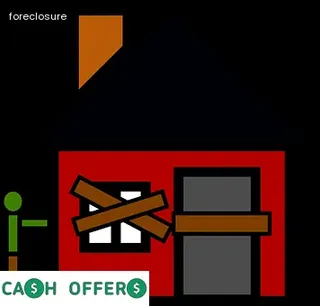When facing foreclosure, it is important to understand the laws and processes involved in order to make the best decision for selling your home. Loss mitigation, which is defined as any action taken by a lender or borrower to avoid or delay foreclosure, can be an effective way of avoiding foreclosure in Texas.
Loss mitigation options may include loan modifications, short sales, deed-in-lieu of foreclosure, repayment plans, and other options that can help borrowers get back on track with their mortgage payments. It is important to remember that not all lenders offer these options and some may require additional documentation or a down payment in order to qualify.
Additionally, borrowers should be aware of the legal ramifications associated with each option before making a decision. Finally, understanding the foreclosure laws in Texas can help borrowers make informed decisions regarding their property and prevent them from losing their home to foreclosure.

Navigating the foreclosure process can be a daunting task. It is important to understand the Texas laws and regulations related to foreclosures, as well as the process for selling your home.
The first step in the foreclosure process is usually a missed payment; if this occurs, it is important to contact your lender right away to see if you can work out a repayment schedule or loan modification. In some cases, lenders may even allow you to keep your home if you make all of your payments on time.
If this isn’t possible, then you will need to start exploring other options such as short selling your home or deed in lieu of foreclosure. Short selling involves finding another buyer who is willing to purchase your home for less than what is owed on it and then negotiating with the lender for them to forgive any remaining balance due.
Deed in lieu of foreclosure involves transferring ownership of the property back over to the lender with no exchange of money involved. Each option has its own risks and benefits that must be weighed before making a decision.
It is also important to remember that Texas law provides certain protections against lenders during this process, including providing homeowners with at least 20 days’ notice before any action can be taken and prohibiting lenders from charging certain fees or penalties outside of what was agreed upon in the original contract.
Foreclosure is a legal process in Texas that happens when a homeowner is unable to pay their mortgage payments. It begins with the lender filing a lawsuit against the homeowner and ends with the home being sold at auction.
In order for this to occur, Texas law requires that certain steps are taken, such as giving the homeowner notification of default and rights of redemption. The foreclosure process can be lengthy and complicated, so it is important to understand what your options are before taking action.
Additionally, you should know that if you are facing foreclosure, there may be other alternatives available such as loan modification or deed in lieu of foreclosure. It is important to seek legal advice on the best way to proceed so you can make an informed decision about how to handle your situation.

In Texas, the mortgage lender can start the foreclosure process after a borrower has missed three payments. This is different from other states, where lenders are allowed to initiate foreclosure proceedings after just one missed payment.
It is important to note that in Texas, the lender must provide written notice of the default before they can begin the foreclosure process. The notice must be sent at least 21 days prior to initiating a foreclosure action and must include details about loan delinquency, any late fees and a statement that if the debt isn’t paid within 30 days after receiving the notice, then they are entitled to start the foreclosure process.
After this notification period has ended, if there is still no payment or agreement between the lender and borrower, then the lender may proceed with filing a lawsuit for foreclosure in court. Additionally, if all necessary documents have been filed with the county clerk's office and approved by a judge, then an order will be issued giving consent to foreclose on a property.
When it comes to avoiding foreclosure, the most important thing to remember is that the sooner you start taking steps to prevent it, the better. It is critical to understand your rights and obligations under Texas foreclosure laws so that you can take proactive measures to avoid having your home go into foreclosure.
The best strategy is to work with a qualified attorney or real estate professional who can provide guidance and advice on how best to handle your particular situation. You may be eligible for loan modifications or other assistance programs that can help keep you in your home.
Additionally, if necessary, you may be able to negotiate with your lender for a workout agreement or forbearance plan in order to get back on track with your mortgage payments. Another option for avoiding foreclosure is to consider selling your home through a short sale or deed-in-lieu of foreclosure; however, it’s important to make sure that this process is done properly in order to avoid any potential legal issues associated with it.
Ultimately, by understanding Texas foreclosure laws and exploring all of the available options, homeowners can take steps towards preventing their homes from going into foreclosure.

Refinancing or selling your home are two options when facing foreclosure in Texas. Refinancing is the process of obtaining a new loan with better terms and rates than the current mortgage loan.
This can help to reduce monthly payments, extend the length of the loan, or both. To refinance a home, you will need to meet certain criteria and pass a credit check.
Selling your home can also be an effective way to avoid foreclosure if you are able to cover any remaining balance due on the mortgage. You should explore all possible options before deciding which is best for you since selling may not be feasible in some cases.
It is important understand Texas foreclosure laws and processes when considering either refinancing or selling your home as these can vary depending on where you live in the state and what type of property you own. Additionally, working with an experienced real estate agent who has knowledge of local foreclosure laws can provide guidance and insight throughout this process.
Bankruptcy is an option that homeowners facing foreclosure in Texas can consider, though it should only be seen as a last resort. Filing for bankruptcy will stop the foreclosure process and will allow homeowners to remain in their home with court protection.
However, this protection is temporary and if the homeowner is unable to make arrangements with the lender or another financial institution, they will still be at risk of losing their home. It's important to understand that filing for bankruptcy does not erase the debt owed on the home and can have significant long-term consequences on a person's credit score and ability to secure new loans.
Additionally, there may be additional costs associated with filing for bankruptcy such as attorney fees. Ultimately, homeowners should work closely with a legal professional to assess their specific situation and determine if bankruptcy is a viable option for stopping foreclosure in Texas.

Yes, it is possible to stay in your home during foreclosure if you qualify for a forbearance or repayment plan with your lender. Depending on the lender and individual circumstances, you may be able to work out an agreement that will allow you to remain in your home while the foreclosure process takes place.
The Texas Foreclosure Prevention Task Force provides resources and assistance to homeowners who are facing foreclosure. In addition, Texas law allows borrowers to reinstate their loans after defaulting by paying the past-due amount and any applicable fees.
This can help homeowners stay in their homes until they are able to secure a new loan or find another way out of their financial obligation. It is important to act quickly when facing foreclosure as delaying can put homeowners at risk of losing their homes permanently.
Understanding the foreclosure laws and processes for selling your home in Texas is essential for any homeowner looking for options that will allow them to stay in their home during this difficult time.
A preforeclosure notice is the first step in the process of foreclosure in Texas. It is a legal document issued by a lender to homeowners who are behind on their mortgage payments.
The notice informs the homeowner that they are in default and must take action to either pay off the debt or negotiate an alternative arrangement with the lender. The foreclosure process does not begin until after the homeowner has been given this notice, which may be sent via certified mail, email, or text message.
This notice serves as a warning to homeowners that if they do not respond or make arrangements with their lender, then the lender may begin foreclosure proceedings and try to take back ownership of their home. Understanding this process and knowing what to expect when receiving a preforeclosure notice gives homeowners a better chance of avoiding foreclosure and selling their home on their own terms.

The most common Texas foreclosure process is known as judicial foreclosure. This kind of process is initiated by a lender when a homeowner fails to make payments on their mortgage.
The lender will file a lawsuit against the homeowner in court, and if the court finds that the homeowner has failed to pay their mortgage, they will issue an order for foreclosure. This order gives the lender permission to take possession of the property and sell it at auction.
In some cases, the court may also require the homeowner to repay any outstanding debt as part of this process. During this time, homeowners have a right to appeal any decisions made by the court or attempt to negotiate with their lender in order to avoid foreclosure.
Regardless of what happens during this process, it's important for homeowners to understand their rights and responsibilities under Texas law in order to protect themselves from unnecessary losses or complications.
Defaulting on a mortgage in Texas can have serious consequences for homeowners. By not meeting the legal obligations of their loan, a homeowner risks foreclosure proceedings initiated by their lender.
When defaulting on a mortgage, Texas law allows lenders to pursue payment through judicial foreclosure or non-judicial foreclosure. Judicial foreclosure is an action taken through the court system, while non-judicial foreclosure is an administrative process handled directly between the lender and the homeowner.
Foreclosure can lead to significant financial hardship, including damage to credit scores, eviction from the property, and difficulty obtaining future mortgages. Additionally, if a homeowner does not pay off their loan during the foreclosure process they may be responsible for any difference between what is owed and what is recouped by the lender during sale of the property.
Furthermore, a homeowner may owe additional fees if they are unable to pay off their remaining balance within four months of the initial foreclosure proceedings. Though these potential consequences are severe, it is important for homeowners to understand that they have rights and options when facing foreclosure in Texas.

In Texas, homeowners facing foreclosure have several options available to them to stop the process. One of the first steps is to contact the lender and discuss a repayment plan or loan modification.
This may involve a forbearance agreement that reduces or suspends payments for an agreed period of time or refinancing the loan to adjust the payment terms. If these solutions prove unsuccessful, then other options such as filing for bankruptcy, getting assistance from a credit counselor, or working with an attorney who specializes in foreclosure can also be considered.
Homeowners may also be able to sell their home before it goes into foreclosure by negotiating with the lender and receiving approval from them in order to do so. This process requires an understanding of Texas foreclosure laws and processes for selling the home in order to ensure it meets all requirements set forth by the state.
In Texas, deficiency judgement laws are put in place to protect both buyers and sellers of foreclosed homes. A deficiency judgement is a court order for the seller of a foreclosed home to pay back the difference between what is owed on the loan and what was obtained from the sale of the home.
In most cases, it is only when the sale price of the home falls short of paying off the remaining loan balance that a deficiency judgement may be issued. This means that if there is no money left over after paying off the loan, then there can be no deficiency judgement.
Furthermore, it is important to note that Texas law prohibits creditors from suing borrowers for any outstanding debt after foreclosure, so they are unable to seek this type of judgement. If a deficiency judgement is issued, then it must be paid within two years or else it will expire and no longer be enforced by law.
It is important to understand these laws prior to selling your home in order to ensure that you are fully aware of all potential liabilities that may result from a foreclosure process.

Facing foreclosure in Texas can be a daunting experience, and it’s important to understand your options before deciding whether or not to let your house go into foreclosure. Texas is a non-judicial foreclosure state, which means that the lender does not have to go through the court system and can instead foreclose directly on the property.
In order to do this, they must provide specific notices and adhere to certain timelines that homeowners should familiarize themselves with. It is also important for homeowners to know their rights when facing foreclosure, including the right to reinstate the loan if they are able to bring payments up-to-date or can negotiate an alternate arrangement with the lender.
Additionally, homeowners should consider how long it would take for their credit score to recover after foreclosure and any other costs associated with it such as moving expenses. Understanding all of these elements thoroughly before making a decision is key in ensuring that you make an informed choice about whether or not to let your house go into foreclosure in Texas.
One of the most important steps in avoiding or stopping a foreclosure sale date is to negotiate with your lender. There are several strategies you can employ to do this, such as requesting a loan modification or forbearance agreement.
A loan modification involves changing the terms of the loan, including reducing interest rates or extending repayment periods. A forbearance agreement allows you to temporarily suspend payments while you work out an alternate payment plan.
You could also request a short sale, which means selling your home for less than the amount owed on the mortgage and having the lender agree to accept that amount in full satisfaction of the debt. This strategy is beneficial if you cannot afford to make payments on your mortgage and need a fresh start financially.
Additionally, some lenders may be willing to accept a deed-in-lieu of foreclosure, which involves giving up ownership of your home in exchange for forgiving any remaining mortgage debt. Ultimately, understanding Texas foreclosure laws and processes can help you find an appropriate solution for your situation and negotiate with your lender to avoid or stop a foreclosure sale date.

In Texas, homeowners facing foreclosure have certain rights when they receive an eviction notice. It is important to understand the laws and processes associated with foreclosure in order to protect these rights.
When an eviction notice is received, the homeowner has the right to challenge the foreclosure action and contest it in court if they disagree with the lender’s claims. Additionally, homeowners have the right under Texas law to seek a loan modification or another form of relief that may prevent foreclosure.
Homeowners also have the right to negotiate with their lender and request forbearance or repayment plans that can help them stay in their home during a financial hardship. Furthermore, homeowners may be able to take advantage of government programs such as Hardest Hit Funds or Mortgage Assistance Relief Services (MARS).
Finally, if all other options fail, homeowners can also choose to sell their home through a short sale process before they are evicted so they can avoid further damage to their credit score.
In the State of Texas, whether or not you are required to pay taxes or other fees after your home is sold at auction during the course of a foreclosure action depends on a variety of factors. The amount of money owed in taxes and other fees may vary depending on how much equity you had when the foreclosure began, if you owe money to any lien holders, and the amount of time that has passed since the sale.
Generally, if your home was sold at auction for more than the total owed to lien holders and you still had equity in the property, then you will be responsible for paying taxes on any remaining profits from the sale. However, if there were no profits made from the sale or if it has been more than two years since the sale occurred then you may not be liable for any taxes or other fees.
It is important to speak with an experienced tax attorney about your specific situation in order to determine what obligations, if any, that you have after your home is sold during a foreclosure action.

When facing foreclosure in Texas, homeowners need to be aware that there are various assistance programs available. These can include loan modification or forbearance agreements as well as repayment plans and other options to help keep the home from going into foreclosure.
Additionally, the Texas Department of Housing and Community Affairs provides free counseling and foreclosure prevention services, helping homeowners navigate their options when they are unable to make mortgage payments. Depending on income level, some Texans may qualify for financial assistance through their local community action agencies which provide grants, loans and other forms of aid.
In certain cases, lenders may also offer a short sale, allowing homeowners to sell their property for less than what is owed on the mortgage in order to satisfy the debt and avoid foreclosure. Knowing all of these potential alternatives can be beneficial for anyone considering foreclosure in Texas.
If a homeowner in Texas does not pay their mortgage, even if they are not in a forbearance program or loan modification, they may face foreclosure. Foreclosure is a legal process that allows the lender to repossess the property if an agreement cannot be reached between both parties.
The exact process of foreclosure varies by state, but generally, lenders must provide written notice to the homeowner before starting the process. In Texas, lenders can start proceedings without going to court.
This is known as non-judicial foreclosure and can often be completed more quickly than judicial foreclosure proceedings. If a homeowner receives notification of pending foreclosure, they should immediately contact their lender to discuss potential options for avoiding it.
These may include obtaining a loan modification, entering into a repayment plan with the lender or selling the home through short sale. It is important for homeowners to understand all of their options and take action as soon as possible so that foreclosure can be avoided or delayed.

After a bankruptcy or home repossession, rebuilding credit can be a daunting task. Fortunately, understanding the Texas foreclosure process is an important step to helping homeowners rebuild their finances and credit score.
Knowing what to expect from the foreclosure process in Texas, including at what point it becomes public record, how long it takes and other legal considerations, can help homeowners regroup and make sound financial decisions after the foreclosure. Taking steps such as making timely payments on secured debt or paying off past due debts can help improve creditworthiness.
Additionally, maintaining a positive relationship with creditors after foreclosure is important for repairing credit ratings and may lead to more favorable terms when obtaining future loans. For those looking to buy a house after a foreclosure, options such as Federal Housing Administration (FHA) Loans can provide an opportunity to qualify for better loan rates than conventional mortgages.
Understanding what lenders look for in your credit report along with the laws surrounding foreclosures in Texas will go a long way towards helping you rebuild your financial health.
When a house goes into foreclosure in Texas, the owner will receive a Notice of Default from the lender. This document informs them that they have missed their loan payments and gives them an opportunity to make up for missed payments or sell their home as a way of avoiding foreclosure.
The homeowner must then decide if they want to make up for past due payments or try and sell their home before it is foreclosed on. If the homeowner decides to sell, they must follow the foreclosure process set out by Texas law.
This involves providing notice of intent to sell the property, holding an auction or court-ordered sale, and abiding by any special procedures required for certain types of properties. After all legal processes are complete, ownership of the home transfers to the highest bidder at the sale.
Finally, if any money remains after paying off all liens attached to the property, these funds are distributed according to Texas state law.

People may let their house go into foreclosure for a variety of reasons. Financial hardship is the most common cause, with job loss, medical expenses, and other unexpected costs taking a toll on an already strained budget.
In some cases, people may simply be unable to keep up with their mortgage payments due to an inability to refinance or modify terms in order to make them more affordable. Other times, people may decide that it’s better for them financially (and emotionally) to walk away from the home rather than trying to maintain it.
With the current economic crisis, many homeowners have found themselves underwater on their mortgages and unable to keep up with payments as housing prices decline across the country. Whatever the reason, when a homeowner falls behind on his or her mortgage payments, it can quickly lead to foreclosure proceedings in Texas if they don’t take proactive steps to avoid it.
In Texas, the average foreclosure process can take anywhere from a few months to over a year. The length of time is dependent upon the specific steps taken in the foreclosure process and the borrower's ability to respond to their lender's attempts to collect payment.
The legal timeline begins when the homeowner defaults on their mortgage payments, after which they will have 20 days to cure the default or else they will be served with a Notice of Default and Acceleration (NODA). The NODA must include information about how much money is owed and how long they have to pay it back.
If they are unable to bring their payments current, then after 30-60 days, their lender can file for a foreclosure through the Texas courts. Once this is filed, it can take an additional 120-180 days for a judge to approve the foreclosure sale.
During this period, homeowners may still be able to negotiate with their lender or utilize other options such as loan modification or repayment plans that could help them avoid foreclosure. However, once a judge approves the sale of their home in court, the property is immediately sold at auction and it becomes too late for any further negotiations or arrangements.
Therefore understanding Texas foreclosure laws and processes is important for anyone who wishes to sell their home before being forced into foreclosure by their lender.
If you are facing foreclosure in Texas, there are several ways to delay the process. First and foremost, you should contact your lender as soon as possible to discuss your options.
You may be able to restructure your mortgage loan or create a repayment plan that works for both you and your lender. Additionally, if you are eligible for mortgage assistance programs like HAMP (Home Affordable Modification Program) or HAFA (Home Affordable Foreclosure Alternatives), these can help you avoid foreclosure altogether.
In some cases, filing for bankruptcy may also delay a foreclosure. Finally, it is important to research Texas foreclosure laws and processes, as they vary from state-to-state.
Understanding the specific laws of Texas can help you make informed decisions about delaying a foreclosure on your home.